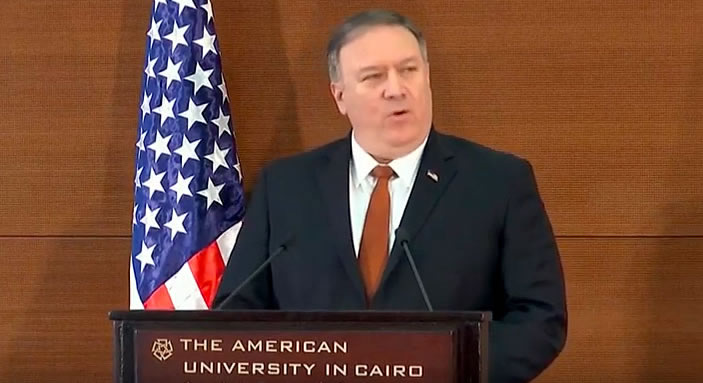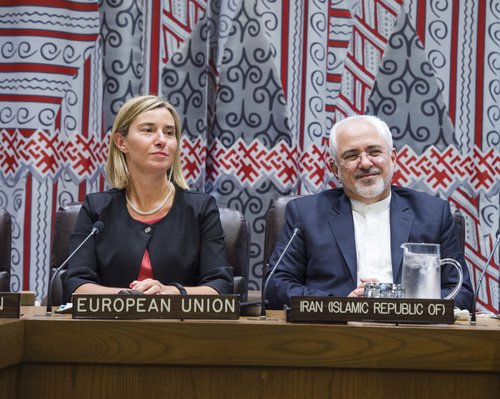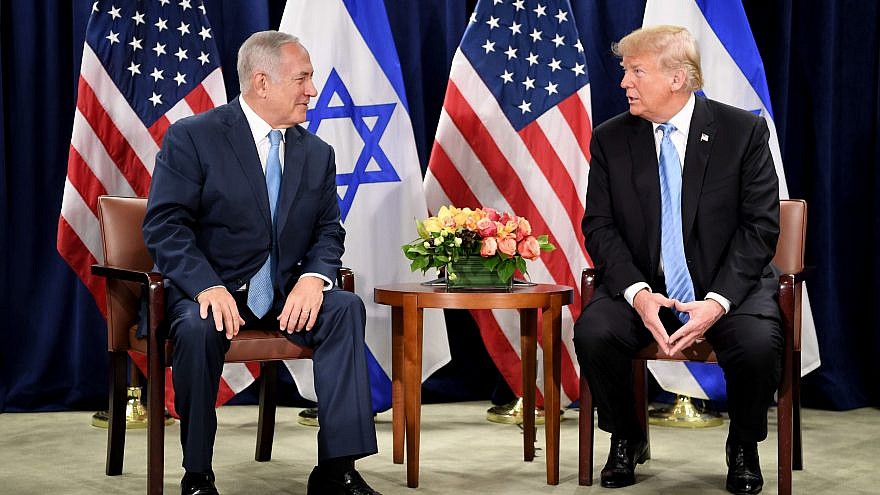Israel appears to be on the same page with the Trump administration regarding Iran, with the United States focusing on reimposed economic sanctions and overt diplomatic stances while Israel handles covert and military components.
Airstrikes by the Israel Defense Forces on Iranian targets and proxies, such as Hezbollah in Lebanon, in neighboring Syria and elsewhere in the region are meant to keep Tehran’s forces in check.
“We are operating both against Iran and against the Syrian forces that are abetting the Iranian aggression,” said Netanyahu, according to Reuters.
However, on Wednesday, Russia warned Israel not to carry out additional “arbitrary” airstrikes in Syria on Iranian targets. It remains unclear how far Russia is willing to go to confront Israel over its actions in Syria.
Nevertheless, Emily Landau, director of the Arms Control and Regional Security Program at Tel Aviv University’s Institute for National Security Studies, told JNS that the U.S. pressure campaign is the “correct approach.”
“Empirically, pressure is the only strategy that has given the powers facing Iran any leverage and has thus had an impact on Iranian decision-making in the nuclear realm.”
She said “the poor result of the Joint Comprehensive Plan of Action [JCPOA] negotiation was not due to lack of leverage [thanks to the biting sanctions of 2012], but rather to very poor negotiating by the P5+1 and their inability to use the leverage to get a much better result.”
While success of the U.S. strategy at this late stage is far from guaranteed, especially due to the unfortunate opposition of European nations and their determination to set up a sanction-evading system, “this is the only strategy that has a chance,” she added.
Along these lines, the summit scheduled for mid-February to discuss Iran’s destabilizing activities is both a good idea and a welcome initiative to get the message across to Iran that its nuclear, missile, regional and terror-supporting activities are unacceptable, continued the Israeli expert.
The United States is planning to host an international summit next month in Poland to focus on Iran’s regional influence.
Asked about reports of some European responses about their reluctance to participate in what critics are calling an “anti-Iran event,” Landau responded that they “are disappointing, especially from France, whose president [Emmanuel Macron] went the furthest last year in recognizing some of the dangerous flaws in the JCPOA and the need to pursue new strategies, regardless of whether Trump leaves the nuclear deal.”

The refusal of European Union foreign-policy head Federica Mogherini to take part is no surprise, said Landau, going on to point out that the United States is creating a framework for necessary discussion, while some Europeans countries have chosen to reject the opportunity.
“One of the most pressing issues right now on the Iran nuclear front is to pressure the IAEA [International Atomic Energy Agency] to conduct immediate inspections at Iranian facilities that appear in the Iran nuclear archives,” said Landau, referring to the intelligence presented by Netanyahu last April on Iran’s past and possibly future efforts to build a nuclear weapon.
“It has been almost nine months since the archives were first revealed by Netanyahu, and as of yet no inspections have taken place, although the material was turned over to the IAEA. This is unacceptable.”
Andrea Stricker, a senior policy analyst at the Institute for Science and International Security, told JNS that the summit is a good opportunity for the United States to gain agreement from its allies that the IAEA should act on the information in the Iranian nuclear archives.
“The IAEA should conduct inspections to verify that Iran’s military nuclear activities have ended,” she said. “Our analyses of the archive information show that Iran was trying to hide some of these activities in 2003. What their status is today is a particularly urgent question since the JCPOA limits will start to end in five more years.”
A push in Poland for nations to be on the same side
Behnam Ben Taleblu, an Iran expert and research fellow at the Foundation for Defense of Democracies think tank, said that the Trump administration’s maximum pressure strategy on Iran will soon face an important diplomatic test.
Next month in Warsaw, the United States will gather members of the international community to ask them to join in a campaign to change Iranian behavior. “The challenge, of course, will be to make sure such a conference does not replicate the failings of the U.N., where all talk and no action dominates,” said Taleblu.

While the E.U. just recently listed two Iranians and one section of the Iranian Ministry of Intelligence on its terror list, it sadly took two assassinations—one in 2015 and one in 2017—and two thwarted terror attacks in 2018 on the European continent to respond, he continued.
And while many European governments have condemned Iran’s increasing frequency of ballistic-missile flight tests and transfers, the last major E.U. batch of nuclear and missile sanctions came more than half a decade ago.
But there are signs that some Europeans are getting fed up with Iran. In a meeting in Tehran earlier this month with French, British, German, Danish, Dutch and Belgian diplomats, Iranian officials walked out on them.
“There’s a feeling of frustration among Britain, France and Germany, and others after the first phase of diplomacy with Iran,” a senior E.U. diplomat told Reuters.
On the regional file, continued Taleblu, the Trump administration has spent considerable political capital reconceptualizing the Iran threat as more than just nuclear-only. “However, the decision to pull the plug on the U.S. force presence in Syria at a time when America needs to send the strongest signal of resolve against Iran undercuts its own framing of the Iran threat, as well as its larger Iran policy.”
In the nearly eight months since the United States left the Iran nuclear deal, the power of American unilateral sanctions has become perfectly clear.
“But as Iran digs in to resist and find ways to offset American pressure,” noted Taleblu, “the U.S. must work overtime to globalize its maximum pressure campaign.”


























